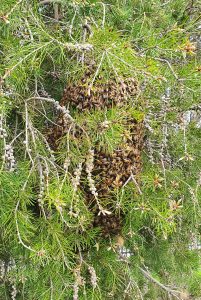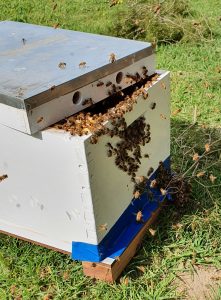Found a swarm; please check the below list and contact the swarm collector closest to your location.
Are you one of our club members in need of a swarm? - or - Have you found a swarm locally?
If you have found a swarm in the Goulburn District, please contact a swarm collector from the list below, preferably one in the area near the swarm location.
If you wish to obtain a swarm for your hive, please check the below table and contact the swarm collector closest to your area in order to arrange delivery of your hive box.
To obtain a swarm, your hive box must be a complete arrangement containing the following items:
- Hive box (one only)
- Base and Lid
- Complete set of frames (usually eight)
- Frames must be wired and fitted with foundation or whatever mechanism your choice of hive requires
- Emlock or strap
- The means to close the hive entrance for transportation to your hive location
- Hive box should be marked with your DPI registration number, see info here Registration Number Tip: Your DPI registration number is displayed on the back of your ABA membership card.
- Your new swarm will need to be moved by you from the collection site to your permanent hive location. You must complete the Tocal College Varroa Mite Online Training Course (takes about 30-40min online and is free) first in order to submit your Hive Movement Declaration Form prior to moving your new hive. Additionally, an alcohol wash must be completed and the result submitted prior to moving the box to its new permanent location. Usually your swarm collector would perform the alcohol wash during the swarm collection.
Once you have received your swarm, we ask that you pay $40 into the Goulburn District Beekeepers Club bank account. Your swarm collector will provide our bank details.
**Please note that most swarm collectors listed below are willing to collect swarms on the club's behalf. This is a fund raiser for our club and means swarms collected will be sold to our club members in order for them to establish their beekeeping practice.
|
Bungendore |
Craig Hinder |
0457 454 749 |
|
|
Collector |
John Gorman |
0408 687 598 |
|
|
Crookwell |
Stuart Wearne |
Collects swarms for personal use and not for sale to club members. stuartwearne72@gmail.com |
0412 843 501 |
|
Goulburn and Gundary |
John Scott | john@ezzybeez.com.au | 0410 590 044 |
|
Marulan
|
Iain Rowe | irowe@hotmail.com | 0450 038 907 |
|
Mummel |
Geoff Bell | gtbjbell@gmail.com | 0428 691 289 |
|
Mummel |
Rowan Bone |
0411 894 437 |
|
|
Windellama |
Robert Shaw |
I charge a fee to cover my expenses. I collect swarms from within approximately 100 km of my home as a service to the community and use any swarms collected to boost my own hive populations. I do not sell swarms. |
02 48445001 0493295849 |
|
|
|
|
|
|
|
|
|
|
|
|
|
||
|
|
|
|
|
|
|
|
|
|
|
|
|
|
|
|
|
|
|
|
Spring is Honey Bee Swarm Season
Have you ever wondered what to do if you should you find a swarm of bees? Swarming happens mostly in spring time and is usually triggered by the bees running out of space in their hives. During the process of swarming, a bee colony decides to split into two or more swarms. These swarms leave the original hive in order to find a new home.
Encountering a large group of swarming honey bees can be daunting as the swarm is quite noisy and looks like a thick cloud of insects. However, if you are confronted with a buzzing cluster - don’t panic! At this stage they are heading for temporary residences such as a tree branch where they cluster into a dense mass of bees about the size of a football. Scout bees then go looking for a new permanent home. In this state bees have full bellies of honey to keep them going for a few days and they are therefore particularly docile.
Sadly, many beehives were lost in bush fires in recent years and we should be pleased to see swarms of bees. They are obviously important pollinators and if they are swarming, they are creating a new colony.
New South Wales is currently subject to a Biosecurity Order due to a Varroa mite outbreak, restricting the transportation or handling of honey bees in order to stop Varroa mite from spreading. Luckily the Goulburn district as well as most of NSW has so far not been affected and at this point in time we are able to collect swarms for relocation to beekeeper premises.
If you spot a swarm, please do not disturb the bees and contact us as soon as possible. The Goulburn District Beekeepers Club is available to provide advice and may be able to collect a swarm in order to settle the bees into a beekeeper’s hive. Beekeepers sometimes may ask for a small fee. Most beekeepers will not remove bees from buildings. ** Please note: Bees that have already taken up residence in a permanent location such as inside a brick wall or inside a chimney are not a swarm of bees, they are an established hive. In these cases it may be necessary to contact a pest control business for removal.


